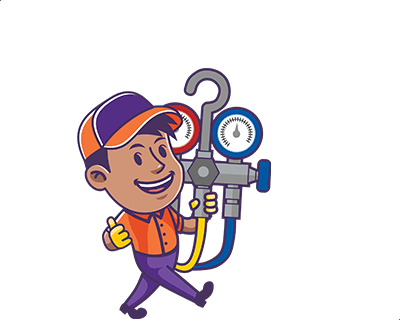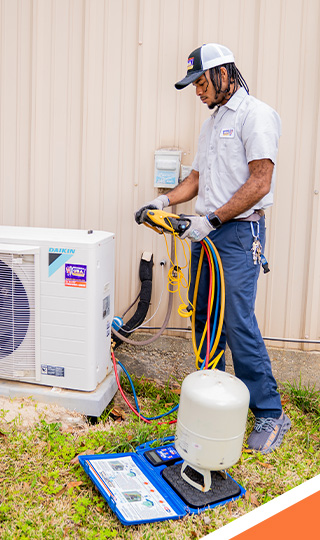
Indoor Air Quality Services in Denham Springs
The air inside your home continuously circulates, which means any pollutants or contaminants present will continue cycling through your indoor spaces. Additionally, modern buildings are often highly insulated, allowing little to no fresh air to enter. Unfortunately, poor indoor air quality (IAQ) can lead to a variety of health issues, including asthma, skin irritation, respiratory discomfort, and other wellness concerns. It can also contribute to frequent flare-ups and a less comfortable indoor environment.
Our skilled HVAC technicians will promptly visit your property to evaluate your indoor air quality. They’ll perform a comprehensive air quality audit, checking for carbon monoxide levels, humidity, and the presence of pollutants. Based on their findings, they’ll recommend and implement the best solutions to enhance the air quality in your space. Contact our HVAC company today to schedule HVAC air quality services in Denham Springs!
How To Improve Indoor Air Quality
As a homeowner, you want to protect the health of you and your family. However, physical health and well-being involves more than watching the food you eat or counting the steps in your daily walks—it also is impacted by the air you breathe. Indoor air quality, or IAQ, refers to the amount of volatile organic compounds (VOCs) present in a building. By reducing the amount of airborne pollutants in your home, you can lower your family’s risk of experiencing adverse symptoms.
At UBA Heating and Cooling, our technicians are trained to conduct comprehensive indoor air quality testing. Our technicians can recognize and identify sources of contaminants, including but not limited to pollen, mold, home renovation projects, pets, and human activities such as smoking or using household cleaning products.
- Increase Ventilation When Possible: Always open doors and windows or use a household fan when completing home construction projects or using household cleaning products.
- Regularly Change Air Filters: Air filters should be changed every three months to prevent clogs or system breakdowns. Depending on household activities or the amount of indoor pets, the air filters may need to be switched more frequently.
Our Values Serving Denham Springs, LA Since 2013
-
Certified & Qualified TechniciansOur technicians use the latest technology to tackle any heating and cooling project with precision and efficiency.
-
Free Estimates AvailableWe're happy to offer free estimates as well as second opinions on your HVAC needs.
-
Customer Care FocusedOur number one priority is to ensure you have an excellent experience with us from beginning to end.
-
Local & Family OwnedAT UBA Heating & Cooling, we extend our family values into our community & customers.



Professional Indoor Air Quality Solutions
Indoor contaminants are invisible to the eye, but their harmful effects are easy to see! Installing a system to improve indoor air quality can promote a healthier indoor environment, improve comfort, and enhance HVAC performance. Our HVAC air quality services can eliminate harmful pollutants and help you find the right solution for your needs and install it with expert care.
- Air Purification: Advanced air purifiers are used by UBA Heating and Cooling to collect fumes, dander, dust, mold, and particulate matter. Depending on the system you choose, some contain UV lights to disinfect the air and eradicate airborne bacteria.
- Air Filters: Air filters are designed to trap pollutants as they pass through the filter’s fiberglass or mesh. Our technicians recommend using a high-efficiency particulate air (HEPA) filter to effectively remove unwanted contaminants.
- Air Cleaners: Through a process known as ionization, electronic air cleaners can remove small particles from the air, including harmful tobacco smoke particles and viruses.
-
What Are VOCs, And Why Are They Harmful?Volatile Organic Compounds (VOCs) are chemicals that easily evaporate at room temperature and are often found in paints, cleaning products, and adhesives. These compounds can be harmful as they contribute to indoor air pollution and can cause short-tern health effects, such as headaches, dizziness, and respiratory issues. Long-term exposure to these pollutants can lead to chronic health problems, such as liver and kidney damage. We recommend using low-VOC or VOC-free products to maintain a healthy indoor air quality.
-
Can A Whole House Purifier Help With Odors And Smoke?Yes, a whole-house air purifier can effectively address odors and smoke. These systems are designed to filter out a variety of airborne particles, such as smoke, pet odors, cooking smells, and other household odors. They usually feature activated carbon filters that absorb and neutralize odors, along with high-efficiency particulate air (HEPA) filters that trap smoke particles. By continuously circulating and purifying the air throughout your home, a whole-house air purifier can greatly enhance indoor air quality, creating a fresher and healthier environment for you and your family.
-
How Do Air Cleaners Compare, And Are There Guidelines For Comparison?When deciding which air cleaners are right for you, it’s essential to consider their effectiveness in reducing indoor air pollutants and potential health risks. We recommend looking for HEPA filters, which are designed to capture fine particles from the air, along with assessing the MERV rating, which indicates how efficient an air filter is. Guidelines for comparison include evaluating the cleaner’s ability to remove pollutants, its suitability for your space, energy efficiency, and noise levels.

Our subscription package grants members convenient access to premier HVAC maintenance and repairs. Our technicians will perform thorough cleanings, inspections, evaluations, and repairs to extend the lifespan of your heating and cooling systems.


.2509020601535.jpg)
.2507092317550.jpg)